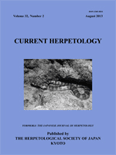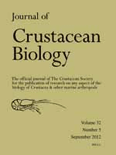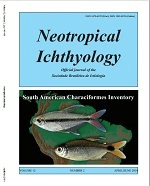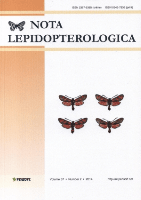
CURRENT HERPETOLOGY
Scope & Guideline
Advancing herpetological knowledge, one study at a time.
Introduction
Aims and Scopes
- Ecological Studies:
Research related to the spatial ecology, habitat preferences, and environmental interactions of amphibians and reptiles, emphasizing their roles within ecosystems. - Taxonomy and Systematics:
Contributions that explore the classification, phylogenetics, and evolutionary relationships of herpetofauna, aiding in the understanding of biodiversity. - Conservation Biology:
Studies that assess threats to herpetofauna and propose strategies for conservation, reflecting an urgent need to protect endangered species and their habitats. - Behavioral Ecology:
Investigations into the behavioral patterns of amphibians and reptiles, including feeding, reproduction, and interactions with their environment. - Physiological and Morphological Research:
Research focused on the physiological adaptations and morphological variations of herpetofauna, contributing to the understanding of their survival strategies. - Impact of Invasive Species:
Examinations of the effects of non-native species on local herpetofauna, including dietary habits and ecological impacts.
Trending and Emerging
- Climate Change Impact Studies:
Research assessing how climate change affects herpetofauna distribution, behavior, and ecology is gaining traction, highlighting the urgency of understanding these dynamics in a changing world. - Invasive Species Research:
There is an increasing emphasis on the ecological impacts and management strategies related to invasive species, particularly in relation to native species' survival and habitat use. - Genetic and Molecular Studies:
The trend towards using genetic tools to study population dynamics, phylogeography, and conservation genetics is on the rise, reflecting advancements in technology that allow for deeper insights into herpetofauna. - Urban Ecology and Herpetofauna:
Emerging studies on how urbanization affects amphibian and reptile populations are becoming more common, indicating a growing interest in the adaptability of these species in human-altered landscapes. - Conservation Genetics and Management Strategies:
Research focused on the genetic diversity and management of endangered populations is increasingly prevalent, emphasizing the importance of genetic health in conservation efforts.
Declining or Waning
- Traditional Morphological Studies:
There has been a noticeable decline in papers solely focused on traditional morphological descriptions without accompanying ecological or genetic analyses, indicating a shift towards integrative approaches. - Generalized Habitat Studies:
Research that broadly addresses habitat use without specific ecological or conservation implications seems to be less frequent, suggesting a move towards more targeted studies that emphasize conservation and management. - Historical Herpetology:
The focus on historical accounts or purely descriptive studies of herpetofauna populations has waned, as contemporary research increasingly emphasizes current ecological challenges and conservation needs.
Similar Journals

JOURNAL OF CRUSTACEAN BIOLOGY
Pioneering Studies in Crustacean ConservationJOURNAL OF CRUSTACEAN BIOLOGY, published by Oxford University Press, is a premier peer-reviewed journal dedicated to advancing the field of crustacean biology. With an ISSN of 0278-0372 and E-ISSN 1937-240X, this esteemed journal has been a critical platform for the dissemination of research since its inception in 1984, encompassing a diverse array of studies related to the biology, ecology, and conservation of crustaceans. As part of the Aquatic Science category, the journal ranks in the Q3 quartile, illustrating its increasing relevance and impact within the scientific community. Although it is not an open-access journal, the quality of content published here ensures that it is highly regarded among researchers, professionals, and students alike. With annual converged issues until 2024, the JOURNAL OF CRUSTACEAN BIOLOGY remains a vital resource for those interested in crustacean research and its implications for broader ecological studies.

ANNALES ZOOLOGICI FENNICI
Celebrating Four Decades of Zoological ExcellenceANNALES ZOOLOGICI FENNICI, published by the Finnish Zoological Botanical Publishing Board, is a prominent scientific journal dedicated to advancing the fields of Animal Science, Zoology, Ecology, Evolution, Behavior, and Systematics. Based in Finland and serving an international audience, this journal has been an essential resource since its inception in 1974, offering valuable insights into biodiversity, conservation, and ecological dynamics. While it holds a respectable Q3 quartile ranking across several relevant categories in 2023, its impactful contributions to the scientific community continue to promote critical discussions and foster research collaborations. Although the journal is not currently open access, its robust indexing in Scopus and recognition within the academic community underscore its significance. As a researcher, professional, or student, engaging with the ANNALES ZOOLOGICI FENNICI not only enriches your knowledge but also aligns you with the forefront of zoological research and conservation studies.

Asian Herpetological Research
Connecting researchers to the heart of herpetology in Asia.Asian Herpetological Research, published by SCIENCE PRESS, stands as a vital resource in the field of herpetology, focusing on the comprehensive study of amphibians and reptiles across Asia. With a distinct ISSN of 2095-0357 and an E-ISSN of 2095-0357, the journal has established itself as a leading publication since its inception in 2011, converging its contributions towards fostering knowledge until 2024. Recognized for its academic rigor, it holds a commendable Q2 quartile ranking in the 2023 categories of Animal Science and Zoology, with a significant 67th percentile placement among its peers in Scopus Rankings. Although Asian Herpetological Research is not an open-access journal, it provides essential insights for researchers, professionals, and students invested in wildlife conservation, ecological studies, and biodiversity. As the journal continues to advocate for the advancement of herpetological studies, it remains a cornerstone for scholarly dialogue and research dissemination within the vibrant scientific community of Asia.

Journal of Vertebrate Biology
Fostering academic discourse on vertebrate evolution.Journal of Vertebrate Biology, a reputable publication established by the Institute of Vertebrate Biology in the Czech Republic, serves as a vital platform for research across the fields of Animal Science and Zoology, Aquatic Science, and Ecology, Evolution, Behavior and Systematics. With its ISSN 2694-7684 and a commendable 2023 Q2 ranking in multiple categories, this open-access journal embraces innovative scientific inquiry and fosters academic discourse. The journal's commitment to disseminating high-quality research is reflected in its Scopus rankings, positioning it within the top quartile in several impactful areas. As it continues to converge its focus until 2024, researchers, professionals, and students alike are encouraged to engage with cutting-edge studies that advance our understanding of vertebrate biology. This publication stands out not only in its scholarly contributions but also in enhancing global awareness of biodiversity and conservation issues.

Neotropical Ichthyology
Unlocking the secrets of fish biology in vibrant ecosystems.Neotropical Ichthyology is a prestigious open-access journal published by the SOC BRASILEIRA ICTIOLOGIA, dedicated to advancing the field of ichthyology within the Neotropical region. Since its inception in 2003, the journal has provided a vital platform for researchers, professionals, and students to disseminate significant findings related to fish biology, ecology, and conservation. With an impact factor that is reflected in its impressive Q1 ranking in Animal Science and Zoology and Q2 rankings in both Aquatic Science and Ecology, Evolution, Behavior and Systematics, it stands as a leading resource for cutting-edge research. Located in Brazil, at the UNIV SAO PAULO, the journal not only contributes to scientific knowledge but also fosters collaboration among ichthyologists dedicated to the rich aquatic biodiversity of the Neotropical region, ensuring that critical insights into fish species, habitats, and conservation strategies are accessible to a global audience.

AMPHIBIAN & REPTILE CONSERVATION
Championing the Cause of Herpetofauna ConservationAMPHIBIAN & REPTILE CONSERVATION, published by the Amphibian Conservation Research Center & Lab, is a leading journal dedicated to the field of herpetology and environmental conservation. With an ISSN of 1083-446X and an E-ISSN of 1525-9153, this journal serves as a vital resource for researchers, conservationists, and students interested in the preservation of amphibian and reptile species. The journal has achieved remarkable rankings, categorized in the Q2 quartile for Animal Science and Zoology, Ecology, and Nature and Landscape Conservation as of 2023, reflecting its significant contribution to the scientific community. Over the converged years from 2016 to 2024, the journal has established itself as an integral platform for disseminating research findings, fostering collaboration, and enhancing the understanding of biodiversity and ecosystem dynamics. By embracing an open-access approach, AMPHIBIAN & REPTILE CONSERVATION ensures that critical research is readily available to a global audience, promoting informed conservation efforts and policy advocacy to safeguard these vital species amidst their declining populations.

Hacquetia
Empowering Ecological Research with Open AccessHacquetia is an esteemed open-access journal dedicated to the interdisciplinary exploration of ecology, evolution, behavior, systematics, forestry, and plant science. Published by SCIENTO since 2007, this journal has established itself as a pivotal platform for researchers and academics looking to disseminate their findings in these critical fields. Nestled in the heart of Warsaw, Poland, Hacquetia offers unrestricted access to its content, promoting knowledge sharing among professionals, students, and enthusiasts alike. The journal, while ranked in the Q4 category across its relevant disciplines in 2023, serves as a valuable resource for those seeking to contribute to and engage with contemporary ecological and botanical research. Its commitment to open access ensures that cutting-edge research is available to a global audience, fostering innovation and collaboration in the scientific community.

RUSSIAN JOURNAL OF HERPETOLOGY
Unveiling the Mysteries of HerpetofaunaRUSSIAN JOURNAL OF HERPETOLOGY is a prominent scholarly publication dedicated to the field of herpetology, focusing on the study of reptiles and amphibians. Published by FOLIUM PUBL CO in the Russian Federation, this journal aims to foster the exchange of knowledge and research in animal science, ecology, evolution, and behavior. With its ISSN 1026-2296 and a significant commitment to high-quality academic discourse, the journal maintains a respectable standing within the Q3 quartile in both Animal Science and Zoology, as well as in Ecology, Evolution, Behavior, and Systematics. This attributes to its Scopus rank among leading journals in related fields, enhancing its visibility and influence. Spanning from 2014 through 2024, it publishes rigorous research that explores the diversity, biology, and conservation of herpetofauna, making it a vital resource for researchers, professionals, and students alike who are invested in the ecological and evolutionary dynamics of these species.

NOTA LEPIDOPTEROLOGICA
Unveiling discoveries in animal science and evolution.NOTA LEPIDOPTEROLOGICA, an esteemed journal published by Pensoft Publishers, has been a cornerstone in the fields of Insect Science, Animal Science, Ecology, and Evolution since its inception in 1995, with a commitment to open access publication since 2014. Based in Sofia, Bulgaria, this journal serves as a vital platform for researchers and professionals alike, facilitating the dissemination of significant findings related to Lepidoptera and broader ecological interactions. With an impressive scope covering vital aspects of biodiversity and taxonomy, NOTA LEPIDOPTEROLOGICA holds a Q3 ranking in its categories according to the 2023 metrics and plays a crucial role in advancing our understanding of insect science. By fostering international collaboration among scholars, the journal not only emphasizes the ecological importance of Lepidoptera but also contributes to global conservation efforts, making it an indispensable resource for students and experienced researchers aiming to deepen their knowledge in these fields.

ANIMAL BIOLOGY
Exploring the Intricacies of Animal LifeANIMAL BIOLOGY is a distinguished journal published by BRILL, focusing on the dynamic fields of Animal Science and Zoology, as well as Ecology, Evolution, Behavior, and Systematics. With an ISSN of 1570-7555 and an E-ISSN of 1570-7563, this quarterly journal serves as a pivotal platform for researchers and professionals seeking to contribute to the understanding of animal biology across diverse ecological contexts. The journal is recognized with a 2023 Scopus ranking of #234 out of 490 in the Animal Science and Zoology category, placing it within the 52nd percentile, alongside a rank of #409 out of 721 in Ecology, marking a solid contribution to the field. Although it currently holds a Q3 quartile in both categories, its commitment to quality research and novel insights continues to bolster its significance within the academic community. The open access option coupled with its publication history from 2003 to 2024 ensures a wide dissemination of knowledge, drawing in a global audience of researchers, professionals, and students eager to explore the intricacies of animal biology. By promoting high-quality discussions and innovative studies, ANIMAL BIOLOGY plays an essential role in advancing the understanding of life sciences and the evolution of biodiversity.